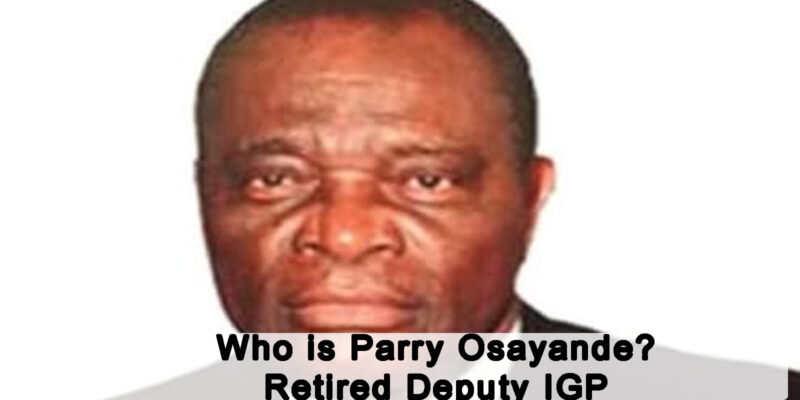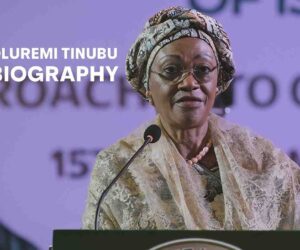Parry Benjamin Osemwegie Osayande (September 29, 1936 – September 28, 2025) was a Deputy Inspector General of Police. He served as the former Bendel state’s police commissioner during the Anini incident, which terrorised Nigeria in the 1980s. Lawrence Anini, the now-defunct Bendel state’s police commissioner, oversaw the apprehension and execution of the famed armed robber.
Parry Osayande oversaw measures to quell the Bauchi religious riots in 1990, which claimed the lives of numerous people. In 1992, Osayande led a Federal Government mission to Namibia on behalf of the United Nations Transition Assistance Group to monitor the South West African Police’s behaviour, conduct, and actions, as well as to help Namibian residents in holding free and fair elections.
Osayande retired as the Deputy Inspector General of Police in 1992. In 2007/2008, the Yar’adua administration nominated him as the Chairman of the Police Reforms Committee. In 2008, the Goodluck Jonathan administration named him as Chairman of the Police Service Commission, a position he maintained until 2013. Osayande served on various committees established by the Nigerian Federal Government to modernise the police service.
Who is Parry Osayande?


Chief Osazuwa Osayande’s family welcomed him into the world on September 29, 1936, in Benin City. His father was an agricultural officer. His mother, Princess Ebose Eweka, was a homemaker. Parry Osayande studied at Immaculate Conception College in Benin City from 1954 to 1958. Throughout his police career, Osayande attended a variety of institutions and received extensive training.
He attended Police College, Ikeja, where he graduated in 1960; Detective Training School, Wakefield, England, where he graduated in 1962; and Police Staff College, Bramshill, England, from which he graduated in 1971. Osayande also attended Metropolitan College, Hendon, England; Police Staff College, Jos; the Royal Institute of Public Administration, England; and the National Institute of Policy and Strategic Studies (NIPSS).
Career
In 1961, Osayande was appointed as station officer of the Central Police Station in Ibadan, Nigeria. The next year, he was part of an armed force dispatched to quell the Agbekoya uprisings in the defunct Western region. The Agbekoya rebellion was led by individuals from Nigeria’s present-day South-west geopolitical zone who were campaigning for tax reductions. These uprisings resulted in the deaths of thousands. In 1962, Osayande was appointed Station Officer of the Central Police Station in Benin, and later that year, he was appointed Staff Officer of the Ogbomosho Police Station.
In 1964, he was appointed staff officer in charge of training at the state headquarters in Ibadan. In 1965, Osayande was assigned to the government residence in Ibadan as ADC to the Governor of the Western Region, Sir Odeleye Fadahunsi. Osayande retained this position until the first military takeover in January 1965. Following the military takeover, Osayande was appointed ADC to Lt Col Adekunle Fajuyi, Military Governor of the Western Region. Osayande served as a Divisional Police Officer in various police divisions across the country from 1966 to 1972. There were five divisions: Ikire, Lanlate, Ahoada, Ogoni, and Diobu.
During his stint as a divisional officer, Osayande participated in various operations, notably Operation Wet ie in the defunct western area, which culminated in the 1966 coup. During the Nigerian Civil War, Osayande was assigned to the fighting front in Port Harcourt to assist in the police action against Col. Ojukwu’s insurgency. In 1969, he was drafted to help suppress the Owo riot, which resulted in the overthrow of Owo’s Olowo, Olateru Olagbegi II.
In 1974, he was appointed Chief Superintendent of Police at Port Harcourt, a position he held until 1975. Osayande served as Assistant Commissioner in Charge of Personnel at the Lagos Police Headquarters from 1975 until 1978. He eventually became the Officer in Charge of the Bendel State Criminal Investigation Department from 1978 to 1980. In 1981, he was appointed Deputy Commissioner of Police in charge of the Railway Police Command, Lagos.
According to Solomon Arase, the prior inspector general of the police, “In June 1981, arising from the necessity for the Force to take ownership in the preparation, defence and utilisation of its financial resources, the Nigeria Police Budget Unit was established under the headship of Retired DIG Parry Osayande, NPM, Mni, CFR, the former Chairman of Police Service Commission who was then a Commissioner of Police.” Osayande served as Commissioner of Police, in charge of the Police Budget, for five years. In 1985, he was appointed as Commissioner in Charge of the Benue State Command in Makurdi. Osayande was the Commissioner of Police for Bendel State in 1986 and Cross River and Akwa Ibom States from 1988 to 1990.
Osayande was appointed Deputy Inspector-General of Police in charge of Force Operations in Lagos in 1990, and he later became the chief of the force’s intelligence and investigation branch in 1992. During his tenure as Deputy Inspector General of Police, Osayande oversaw operations aimed at restoring peace in Bauchi and then in Kano.
At the time, religious riots were on the increase in numerous parts of Northern Nigeria, killing thousands of people. He was promoted from Deputy Inspector General of Police to DIG in Charge of Operations, and in 1992, Osayande led a police squad to Namibia to ensure a smooth and peaceful electoral process.
The police unit led by Osayande was one of 41 police groups from around the world that landed in Namibia for the same objective. The year 1992 marked the conclusion of Parry Osayande’s career in the Nigerian Police Force. He retired as the Deputy Inspector General of Police.
Personal life
Parry Osayande married Irene Amayo, and they have five children.
Death
Parry Osayande, a retired Deputy Inspector General of Police, died barely hours before his 89th birthday. The President of the Immaculate Conception College Old Boys’ Association (ICCOBA) Worldwide, Ighodalo Edetanlen, revealed the former Police Chief’s death on Sunday in a sympathy letter. He was born on September 29, 1936.








